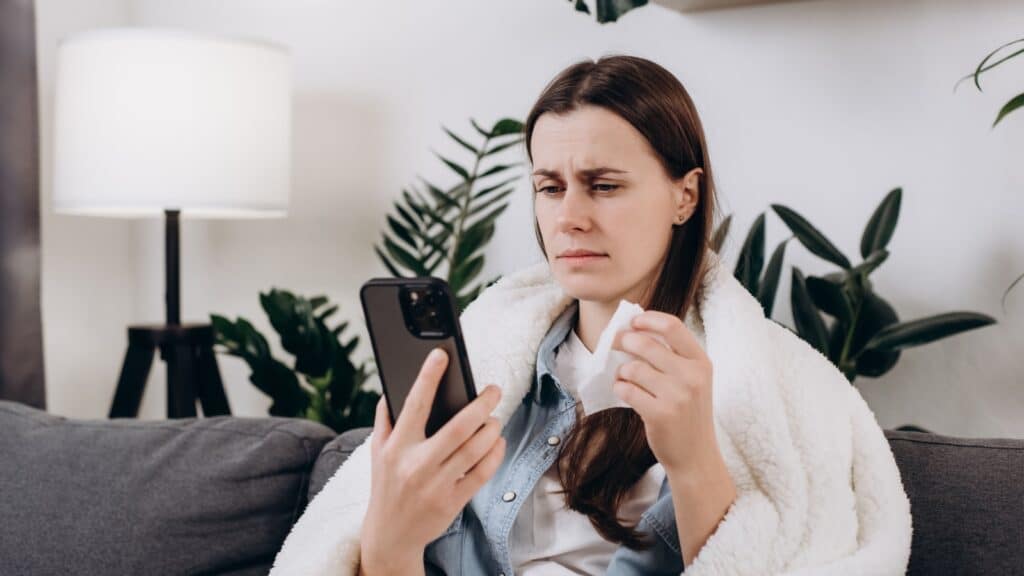Recently, it feels like everyone has become their own doctor. More Americans have begun typing their symptoms into Google and trying online quizzes to find out what’s apparently wrong with them. Some people are even scrolling through TikTok videos about health conditions, then diagnosing themselves with what they find. Why has this become an obsession? Let’s find out.
What “self-diagnosing online” actually means
Self-diagnosing online essentially involves looking up medical information online to understand what could be wrong with them, before seeing a professional. That is, if they ever do. When such behavior becomes a habit, it becomes known as cyberchondria. The term describes those who constantly search online for health information, and it makes them more anxious about their health.
The term itself has existed since the late 2000s, when people began using search engines as everyday tools for health questions. The only difference now is the scale. Today, practically everyone with a phone searches the internet with their health questions.
The curve turned up in 2020
The number of online questions about health increased the moment COVID hit. Around March 2020, data from countries across the world showed massive spikes in symptom searches, including fever and loss of taste. These hit record highs overnight.
Americans were trying to make sense of new symptoms and restrictions by searching for them. Even after COVID symptom searches cooled down, the habit of relying on the internet to understand symptoms stuck.
Social video turned symptoms into short clips
So why have people become obsessed with diagnosing themselves online? A lot of this has to do with social media. Platforms like TikTok have made conversations about medical issues far more casual and easier. Videos tagged with things like #ADHD or #anxiety receive billions of views on TikTok. Some creators are medical professionals. But most are regular people sharing their experiences that viewers recognize in themselves.
However, it’s not all accurate information. Analysis of ADHD videos on TikTok has found that about half were inaccurate or missing key details, yet these videos tend to be the most-watched videos.
Why people self-diagnose ADHD & OCD after scrolling
People see a clip of a creator saying something about how losing focus mid-sentence could be a sign of ADHD. It feels familiar to them. So, they keep watching the video. Then the algorithm floods their feed with more of the same, and before long, it looks like everyone online has the same habits. This starts to feel like proof that the viewer has ADHD.
OCD content follows the same pattern, as it includes short videos about cleaning and intrusive thoughts. They might also talk about counting habits, and these show up everywhere. After enough exposure, everyday behaviors like checking the stove and organizing your desk start to seem like signs of a disorder. Rather than being gullible, the internet blurs where “relatable” ends and “clinical” begins.
Why self-diagnosing feels easier than waiting
One of the major reasons people have begun self-diagnosing is that a proper diagnosis takes patience, money, and time. Not everyone has access to these. Some wait months for an appointment or worry about being dismissed, while others simply can’t afford it.
Meanwhile, the internet gives you an instant answer. You can take a quiz in five minutes or watch someone break down their symptoms in a one-minute video. Social media also creates a sense of community. That sense of being understood is rather appealing, and it feels safer for them to claim a label online than risk being ignored in person.
What can go wrong when people self-diagnose
The real issue comes when “relatable” becomes “I must have it.” A person who’s tired or simply burned out might see a post about ADHD and think it explains everything. But the real issue could be something completely different. They might have sleep issues or thyroid problems, perhaps even depression. But mental health content spreads so fast that there’s no real quality control. Misinformation slips through easily.
As soon as someone labels themselves, they might stop looking for other answers or avoid professional care altogether. They might refuse therapy or the right medication, choosing instead to take unverified advice from strangers online. Their everyday habits become medicalized, and any real conditions risk getting overlooked in the noise.
Why relying on social content can delay real help
Another issue is that some people start to shape their behavior to fit what they’ve seen online. They may start acting distracted or overexplaining their issues. They may also begin labeling habits to match the diagnosis they think they have, which holds them back from finding out what’s really happening.
ADHD gets framed as a personality type instead of a neurological disorder. OCD turns into a joke about being tidy. Essentially, people trivialize real symptoms, and those who need help can end up minimizing their own experiences instead of getting support.

